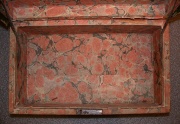Difference between revisions of "Marbled paper"
Jump to navigation
Jump to search
(username removed) |
m (Text replace - "== Authority ==" to "== Sources Checked for Data in Record ==") |
||
| Line 8: | Line 8: | ||
marbled paper; suminagashi (Japanese for ink-floating); ebru (Turkish for two-tone marbling) | marbled paper; suminagashi (Japanese for ink-floating); ebru (Turkish for two-tone marbling) | ||
| − | == | + | == Sources Checked for Data in Record == |
* Hermann Kuhn, ''Conservation and Restoration of Works of Art and Antiquities'', Butterworths, London, 1986 | * Hermann Kuhn, ''Conservation and Restoration of Works of Art and Antiquities'', Butterworths, London, 1986 | ||
Revision as of 06:54, 1 May 2016
Description
A type of decorative paper prepared by mixing or dropping oil paints onto the surface of water, then swirling, and dipping the paper into the surface to produce a marble-like pattern. Marble papers were made in China over 2000 years ago. In the 12th century, Shinto priets in Japan made marbled papers as a divination tool. Two-tone marbling, or Turkish marbling was devloped in Turkey and Persia in the 15th century. By the 17th century, paper marbling became popular in Europe primarily for use as book end papers.
Synonyms and Related Terms
marbled paper; suminagashi (Japanese for ink-floating); ebru (Turkish for two-tone marbling)
Sources Checked for Data in Record
- Hermann Kuhn, Conservation and Restoration of Works of Art and Antiquities, Butterworths, London, 1986
- Matt Roberts, Don Etherington, Bookbinding and the Conservation of Books: a Dictionary of Descriptive Terminology, U.S. Government Printing Office, Washington DC, 1982
- The Dictionary of Paper, American Paper Institute, New York, Fourth Edition, 1980
- E.J.LaBarre, Dictionary and Encyclopedia of Paper and Paper-making, Swets & Zeitlinger, Amsterdam, 1969
- Wikipedia, the free encyclopedia, at http://www.wikipedia.com Comment: http://en.wikipedia.org/wiki/Paper_marbling (Accessed Nov. 9, 2005)
